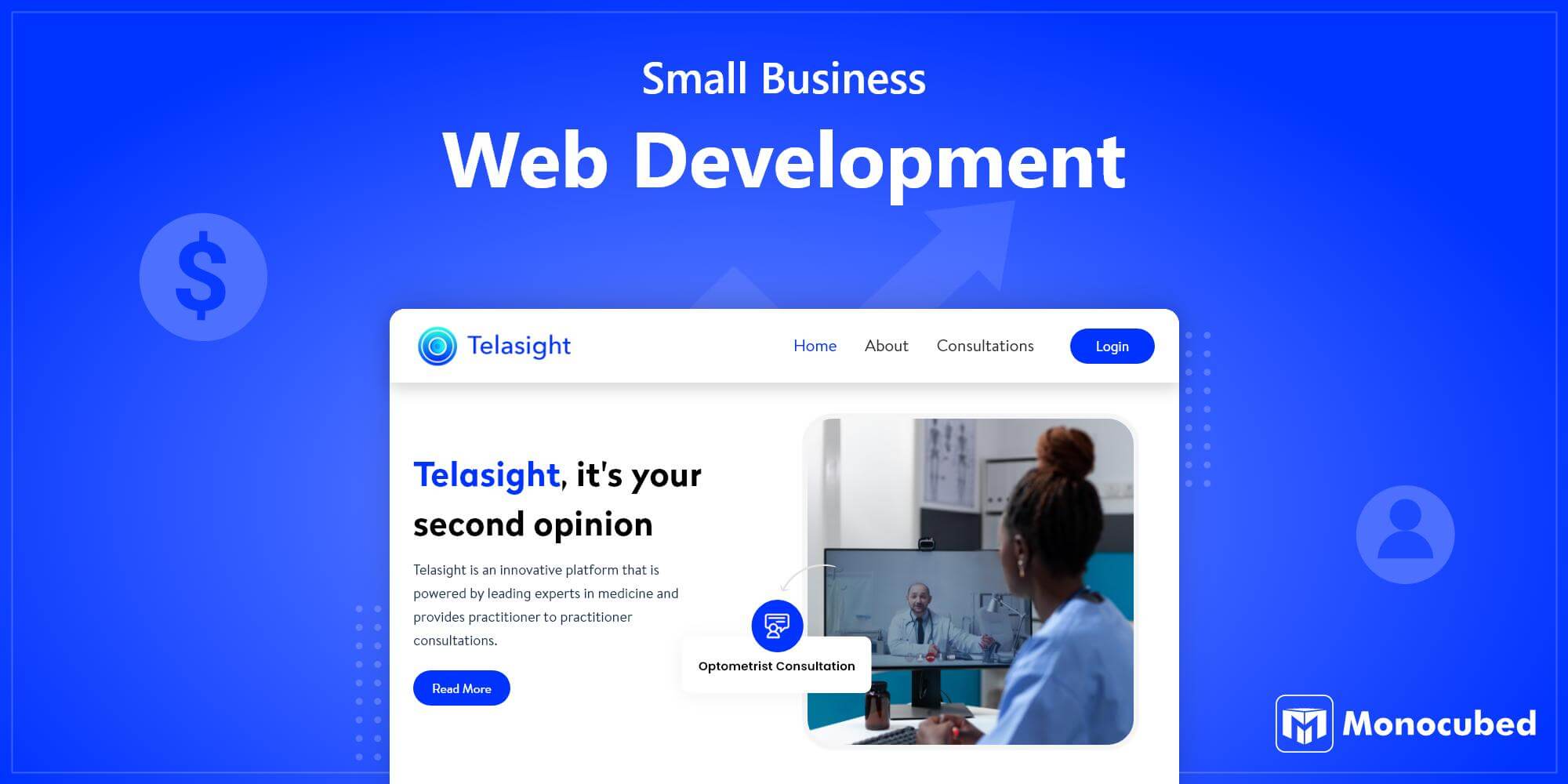Are you looking to transform your small physical store into a digital platform?
Want to develop a web solution to get a significant impact on your business?
Well, small business web development is the solution to all your questions.
Today customers prefer to read reviews or verify the products before using one. In fact, according to Saleslion, 81% of customers are keen to review a product online before heading to the physical store.
So, if you are a small business owner it is recommended to develop a web solution for your business. If you are not aware about web development, here is a comprehensive guide of what is web development.
Without a further ado, let’s get started with the core steps to design and develop a website for your small business.
Contents
- 7 Easy Steps to Develop a Web Solution for Your Small Business
- How Much Time Does it Take for Small Business Web Development?
- How Much Does it Cost for Small Business Web Development?
- 8 Benefits to Develop a Website for Your Small Business
- FAQ About Small Business Web Development
- Ready to Develop a Website for Your Small Business?
7 Easy Steps to Develop a Web Solution for Your Small Business
Once you’ve figured out your business requirements, your website goes through the phases of web development life-cycle. However, follow these below seven steps to launch your online store from scratch.
-
Search a Domain Name for Your Web Development
A domain name is a unique name for your website, and using it, one can find your website on the internet. Selecting a good business name leads to an easier domain choice.
An example of a domain name is “youtube.com.” The first part (‘‘youtube’’) in the domain name is called the second-level domain, which is unique for every website on the internet. And the later part (“.com”) is called the top-level domain.
There are two types of domains
- Generic Top-Level Domains (gTLD) – gTLD are the most commonly used, and the most widely used are .com, .net, .biz,.org, and .info.
- Country Code Top-Level Domains (ccTLD) – ccTLD are associated with specific geographic locations such as .uk, .ru, .cn, .in etc.
You must acquire a domain from a domain registrar. We have compiled the list of domain registrars and the type of domain they provide.
Domain hosting providers Types of domain Website link GoDaddy gTLD and ccTLD godaddy.com Domain gTLD and ccTLD domain.com Namecheap gTLD and ccTLD namecheap.com Dynadot gTLD and ccTLD dynadot.com Gandi gTLD and ccTLD gandi.net Hover gTLD and ccTLD hover.com Google Domains gTLD and ccTLD domains.google.com -
Find a Reliable Web Hosting Partner to Develop a Website
Once you have finalized your domain name, it’s time to find a web hosting provider.
But now, you may wonder why you need a web hosting provider.Web hosting is the process of buying space to house your website on the internet. So, the web hosting provider will allocate space on their server to store your website so that it is available on the internet. Additionally, a web hosting control panel is provided to manage and maintain your website efficiently.
We have shortlisted some top web hosting providers with the best hosting plan:
Web Hosting Providers Plan Name Pricing Hostinger - Single shared hosting
- Premium shared hosting
- Business shared hosting
- $1.99/mo
- $2.59/mo
- $4.99/mo
Bluehost - Shared hosting
- Website builder
- Online stores
- $4.95/mo
- $4.95/mo
- $9.95/mo
Dreamhost - Shared started
- Shared unlimited
- $1.99/mo
- $2.99/mo
Hostgator - Hatchling
- Baby
- Business
- $2.64/mo
- $3.38/mo
- $5.08/mo
GreenGeeks - Lite
- Pro
- Premium
- $2.95/mo
- $5.95/mo
- $10.95/mo
A2 Hostings - Startup
- Drive
- Turbo boost
- Turbo max
- $2.99/mo
- $5.99/mo
- $6.99/mo
- $12.99/mo
SiteGround - Startup
- GrowBig
- Gogeek
- $2.99/mo
- $4.69/mo
- $7.99/mo
Want to Hire Web Developers for Your Business?
Let’s get in touch. We have proficient web developers who can create custom web solutions as per your business requirements.
-
Choose A Web Development Agency for Your Small Business
Choosing a web development company is not as easy as it seems. One wrong decision in choosing a web development agency can ruin the entire project and waste your time as well as resources.
To avoid such situations during the development of your website, we’ve compiled a list of the most important factors to consider when selecting the best web development agency.
-
Check Out The Company’s Portfolio
The most crucial thing you should do is evaluate the experience of a web development team. Knowing your eCommerce team’s specialization will help you determine whether this agency can meet your needs or not.
-
Read Reviews on Clutch
The best way to learn about the company’s competence is from reviews. You can visit the Clutch website. This website specializes in gathering feedback from clients of development companies all over the world.
-
Ask For Client References
You can contact the company’s previous clients and ask about their experience. You could trust the agency if the former clients were satisfied with their work. And, if not, you can look out for other options.
-
See How Fast The Agency Replies
When selecting a web development company, responsiveness is one of several factors to consider. You can give the agency 24-48 hours to answer your request. If interested in your project, they will reply within the duration. You can even outsource web development for the finest results. You will find the best website designer and developers to complete the project in the given time.
Most custom web development companies publish their projects on their websites. You can evaluate the functionality and usability of their live projects. Also, you can visit the company’s profile on GitHub, Behance, and Dribbble.
-
Explain Your Requirements to Your Web Development Partner
Once you have shortlisted the development agency, it’s time you explain your requirements to their website development team.
You can explain to them how you want your website to look, do you want a fully functional website, how many pages you want on your website if they can help you with marketing, and be open to them about everything you want in your website.
Also, you can ask them to add you to a group where you can see weekly updates.
Start with Design and Development of Your Website
Web design and development is an umbrella term that describes the process of creating a website. Web design determines the look and feel of a website, while web development determines how it functions.
After you have explained all the requirements to the developers, the web designer will start creating a low-fidelity user interface for your website.
The web design will be shown to you, and if you approve the design, they will create a high-fidelity wireframe by adding colors, text, images, and many more things that will represent how your website will look.
The developer will start building the website on a production server so you can view it online without making it public. You can hire a web developer with Monocubed to develop and design exclusive web solutions for your business.
You can collaborate with the copywriter and other agency personnel during that time to finalize the voice, content, and graphics. This is usually the most time-consuming part of the process, but it is also the most crucial.
Test and Launch Your Website
When your website is ready with all the tools and functionality, it’s time to test it on the test server.
You will be sent a link to the website, where you can view and test all the functionalities and check if everything works fine. If any bugs are found, the developers will remove the bugs before launching your website.
Finally, your new website is ready to go live. When you give your approval, the developer will begin the launch process. This includes configuring hosting and pointing domains. Your site should be live and ready with the SSL certificate for you and the rest of the world to enjoy within a few hours.
Post Deployment Maintenance
Once the website goes live, the process does not end here. There are several post-deployment tasks that a web development company follows. We at Monocubed, provide the source code and project documents post development, providing post-development support after receiving feedback from the users.
This stage holds equal importance as the real purpose of developing a web app starts after deployment. Changes to necessary updates, and user feedback is equally important.
Since you have understood the steps, let’s even understand the timeline to develop your web solution.
How Much Time Does it Take for Small Business Web Development?
The average timeline for a small business web development ranges from 12 weeks-20 weeks.
Let’s break this timeline so that you can have a clear picture:
| Factors | Time |
|---|---|
| Research | 1-4 weeks |
| Finding the right development team | 1-3 weeks |
| Action plan | 1-2 weeks |
| Design and development | 4-8 weeks |
| Testing and revision | 1-2 weeks |
Let’s even check the cost to build your website.
How Much Does it Cost for Small Business Web Development?
On average, a website for your small business can cost anywhere between $5000 and $10,000. However, the web app development cost is determined by its size, complexity, and whether or not you hired a development agency.
The various factors are
| Factors | Time |
|---|---|
| Domain | $1-$12 / domain |
| Hosting Plan | $24-$120 /year |
| SSL certificate | $0-$1500 /year |
| Development | $2000-$15000 |
| CMS | $2000-$25000 |
Above we have understood the time and cost to develop a website, let’s understand why it is important to develop a website for your small business?
8 Benefits to Develop a Website for Your Small Business
“Your storefront may be temporarily closed, but your website is always open.”
Customers can find your business using search engines and make purchases. A website aids in the online marketplace and credibility building.
Let us look at why having a website is important for your business.
-
Web Portal Improves Credibility, Attracts New Customers and Gains Trust
Having an attractive and professional website is the best way to differentiate yourself from the competition.
Today, not having a website can question a company’s legitimacy. A website can be the face of your company; it creates a strong first impression and trust and credibility in customers’ minds.
-
Web Portal Improves Brand Awareness and Increase Your Brand Value
A website will create brand awareness and help you reach customers. It helps to establish a positive image by letting the audience know who you are and what you stand for.
A website provides customers with trustworthy information, which helps to distinguish your business from the competition.
-
Web Portal Increase Sales and ROI of the Business
Having a website for your business can help you generate more leads and sales. When people find your business online, they try to learn more about your products or services and your business.
They can obtain the business’s contact information from the website, providing you with a growth opportunity and the opportunity to increase your sales.
-
Web Portal Improves Customer Experience
You or your staff may often be unable to attend to and respond to all calls, which may leave a customer dissatisfied and cause you to lose a prospect. To optimize this process and drive business growth, leveraging AI-powered revenue intelligence can be an effective strategy.
A well-designed website can assist customers in quickly finding useful information without having to call.
-
Web Portal Improves Site Rankings
One of the best strategies you can implement in your website is to optimize your website to be SEO friendly by getting help from any top SEO agencies in London.
Customers searching for these keywords will be able to find you if relevant keywords and copy are used throughout your website. This improves your SEO ranking on search engines like Google and allows your business to rank higher for high-intent keywords.
-
Web Portal Gathers Data About Customers To Reach Wider Audience
Who are your potential customers?
You can use the embedded analytics tool to learn about the customers visiting your website.
For example, did they find you via a specific search engine? What types of content or pages do they most frequently visit? How many unique visitors do you have on your website? Do you know how the bounce rate of specific pages looks?
With the help of website visitor tracking, obtaining and using this data can assist you in identifying these customers and strategizing about how your company can improve its experience.
-
Web Portal Creates a Professional Reputation To Increase Brand Value
Use your small business website to include information that will help your company be perceived favorably and professionally. Some other reasons are:
- Include the phone number and mailing address of your company.
- Sync your social media profiles.
- Consider incorporating chatbots or live chat as it engages customers in real time.
(Example like: WhatsApp chatbot, E-commerce chatbot, customer support chatbot, etc.) - Share top-notch feedback from sites such as Yelp and Trustpilot.
-
Web Portal Helps with Promotional and Branding Activities
Customers want to know they are working with a trustworthy company that understands its industry. Use the company blog to share company news and to write posts that answer frequently asked questions or provide tips on a specific topic.
Create and share social media content that allows you to interact with customers. One of the personalized ways to market your business is to send promotional whatsapp messages. This is an engaging way to interact with your audience. You should also consider starting a vlog or podcast to expand your audience. These marketing ways offer a unique direction for sharing expertise in your field. Before diving into marketing, draft a social media audit checklist. This ensures you’re strategically reaching your target customers.
This type of content not only promotes the company but also assists it in establishing a strong reputation as a thought leader.
If you are still confused, you can reach out to web development consulting experts for a better learning curve.
Looking for an Experienced Web Development Company?
Your search ends here. Monocubed gives you the best team with full-fledged knowledge of technology stack. We aim to give you the right solution for your business.
FAQ About Small Business Web Development
-
How much does it cost to build a small website?
A website development for your small business starts from $10,000 on an average. The total cost of a website is determined by its size, complexity, and whether or not a professional web designer is hired. However, if you are on a tight budget, you can learn website development that will save you thousands of dollars.
-
What is the purpose of using the hosting services?
The hosting services are used to host your website on a web server where your website gets stored. Web hosting makes the files that comprise a website accessible online. A server hosts every website you’ve ever visited.
-
Which are the small business website examples?
Some examples of a small business website are
- MOAT
- Soundstripe
- AOline Bags
- The Balloon Queen
-
What should be the learning curve of a fresher for web development?
You can start with learning front-end technologies such as HTML, CSS, and JavaScript. Once your basics are clear, you can learn backend technologies such as SQL, NodeJs, etc.
It will take around 6 months to 12 months to learn all these technologies and create your website. To know more about front-end and back-end web development, check out the detailed guides on the best front-end frameworks and the best backend frameworks.
-
How much does it cost to design a website for a small business?
A web designing company approximately charges $50 to $80 per hour, and freelance website designers approximately charges up to $75 per hour. Overall UI/UX design development can cost anywhere from $1,000 to $4,000.
Ready to Develop a Website for Your Small Business?
In this article, you read how valuable a successful website could be for your business. In today’s world, it is very difficult to reach out to customers and engage them online without a website.
A website can still benefit your business even if you don’t have an online business and only have a brick-and-mortar store that serves local customers. So, any business looking to make a name for itself in the modern marketplace must have a website.
Still, have doubts?
Don’t worry, you can reach out to us.
Monocubed is a reputable web application development firm based in Canada that caters to small to medium-sized businesses and entrepreneurs while ensuring the application is built in a secure environment. We design and develop user-friendly and accessible web applications for various industries.
Our web development experts make every effort to nurture and develop your ideas into bespoke web applications that help you increase your business’s productivity.
 By Jeel Patel
By Jeel Patel



